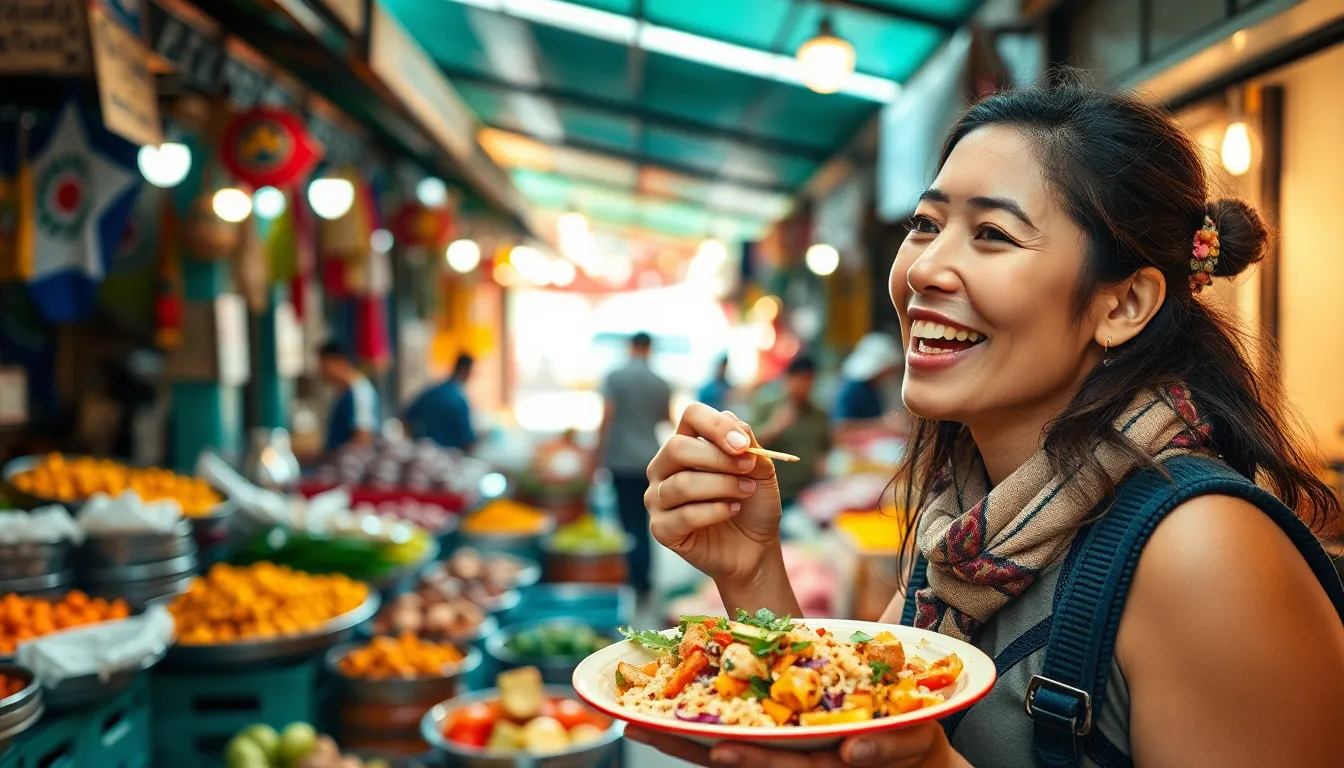Imagine wandering through vibrant markets, the aroma of spices dancing in the air, while your taste buds tingle with anticipation. Food travel isn’t just about filling your belly; it’s an adventure that tantalizes the senses and connects cultures. From street food stalls to gourmet restaurants, every bite tells a story worth savoring.
Table of Contents
ToggleUnderstanding Food Travel
Food travel encompasses the exploration of culinary experiences linked to various cultures. It includes tasting authentic local dishes and engaging with the stories behind them.
Definition of Food Travel
Food travel represents a journey driven by the desire to experience food from different regions. It emphasizes tasting local flavors, discovering traditional recipes, and understanding cultural significance. Travelers seek out street vendors and gourmet restaurants alike to explore the full spectrum of a destination’s cuisine. This form of travel enriches the experience, allowing adventurers to connect with locals through shared meals. By immersing themselves in culinary practices, they gain insight into cultural heritage and customs.
The Concept of TBFoodTravel
TBFoodTravel focuses on the intersection of travel and food, aiming to inspire exploration through gastronomy. The concept aligns with sustainable tourism and promotes responsible food practices. It encourages travelers to support local businesses and engage with authentic culinary experiences. By highlighting unique food destinations, TBFoodTravel fosters appreciation for regional ingredients and cooking methods. Culinary road trips, food festivals, and cooking classes form part of this journey, creating memorable connections between travelers and chefs. Through these experiences, they celebrate food diversity and contribute to preserving traditional cooking methods.
The Importance of Food Travel

Food travel enhances cultural connections and enriches experiences. Engaging with local cuisines fosters understanding and appreciation of diverse cultures.
Cultural Exchange Through Cuisine
Cuisine serves as a bridge between cultures. Travelers explore authentic dishes, gaining insight into traditions and social norms. Each meal tells a story, revealing historical influences and regional ingredients. Through shared experiences, connections emerge among locals and visitors. Additionally, participating in cooking classes allows travelers to learn techniques, deepening their appreciation for local culinary practices. These interactions encourage cultural exchange, reinforcing bonds across community lines.
Economic Impact on Local Communities
Food travel significantly contributes to local economies. Tourists spending on meals supports restaurants, markets, and street vendors. This economic boost fosters job creation and enhances local businesses. Culinary tourism promotes sustainable practices, encouraging visitors to prioritize fresh, locally-sourced ingredients. Increased demand for regional specialties can rejuvenate traditional food vendors, preserving culinary heritage. Local communities benefit through enhanced visibility, attracting more visitors eager to explore diverse flavors. Food tourism ultimately results in a thriving economy, benefiting both travelers and the places they visit.
Popular Destinations for Food Travel
Food travel invites culinary enthusiasts to experience various flavors and cultures worldwide. Numerous cities stand out for their vibrant food scenes and unique gastronomy.
Top Culinary Cities Around the World
Tokyo offers a spectacular blend of traditional and modern Japanese cuisine. Celebrated for sushi, ramen, and street food, Tokyo teems with options for food lovers. Paris showcases its rich culinary heritage through classic dishes like croissants and coq au vin, along with popular bistros. Bangkok mesmerizes visitors with its vibrant street food culture, featuring dishes like pad thai and som tam. Mexico City presents an array of flavors, from tacos to mole, highlighting local ingredients and traditions. Each city enriches the food travel experience with diverse culinary offerings.
Unique Food Experiences
Cooking classes in Italy provide hands-on insight into traditional pasta-making techniques. Guided food tours in New Orleans immerse travelers in local cuisine, showcasing gumbo and beignets. Street food markets in Taipei create a lively atmosphere where travelers can savor their way through night markets. Wine-tasting excursions in Napa Valley reveal regional varietals and pairing options. Culinary festivals in Barcelona celebrate local ingredients, bringing chefs and foodies together. Engaging in these unique experiences deepens understanding and appreciation of each destination’s culinary landscape.
Tips for Food Travelers
Food travelers can enhance their experiences with thoughtful planning and awareness of health considerations.
Planning Your Food Itinerary
Curate a diverse food itinerary that includes local specialties. Research popular dining spots and hidden gems to find a mix of street vendors and gourmet restaurants. Prioritize visiting markets for fresh ingredients and authentic dishes. Engage with locals to uncover recommendations and personal favorites. Create a balance between planned meals and spontaneous finds for a richer experience. Allocate time for cooking classes or food tours, which provide insight into cultural culinary practices. Use social media and food blogs for inspiration and updated information.
Safety and Health Considerations
Ensure food safety by being cautious about where meals come from. Always consider hygiene practices at food vendors and restaurants. Drink only bottled or treated water to avoid potential health issues. Familiarize yourself with local food customs, which can influence safety and enjoyment. Carry essential medications for food allergies or intolerances if necessary. Respect personal dietary restrictions, as these may differ from local practices. Prioritize eating foods that are cooked thoroughly and served hot to minimize risks.
Food travel isn’t just about tasting new dishes; it’s a journey that fosters cultural connections and enriches the travel experience. By exploring local cuisines and engaging with the stories behind them, travelers gain a deeper appreciation for the places they visit.
TBFoodTravel emphasizes sustainable practices and supports local businesses, ensuring that culinary adventures benefit both visitors and communities. With each meal, travelers not only savor unique flavors but also contribute to the preservation of culinary traditions.
As they embark on their food travel adventures, thoughtful planning and awareness of local customs enhance the experience. This approach allows travelers to create lasting memories while celebrating the diverse tapestry of global cuisine.






